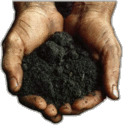
Plant & Soil Nutrition
by Bill Pinto

WE CANNOT grow healthy nutritious plants with unhealthy, imbalanced soil. Man was made from “the dust of the Earth,” and our health is dependent upon healthy nutritious rich plants, grown in mineral rich soil. Most foods grown today are deficient in mineral content, primarily due to conventional farming practices, inadequate soil replenishment, pesticides, and chemical fertilizers, that all create imbalances. Thus the rapid increase in degenerative disease.
Unfortunately, buying organic produce may not be the answer. Today, organic farming has become an industry, and is being commercialized. Consider the facts that not all organic farmers have the same ethical values, and that the certifying bodies are relaxing their standard of inspections. For example, on-site inspections are becoming less frequent with no soil or leaf analysis to ascertain whether farmers are complying with the correct standard of procedure.
True organic farming involves a lot more than just avoiding chemicals and pesticides. Soil health should be the heart of all farming practices.
To grow healthy mineral rich food on a small scale perhaps for a few families is not difficult. But on a commercial level it is more costly and labor intensive. And with an ever growing demand for organic produce, coupled with high prices, some organic growers are becoming more concerned with quantity rather than quality.
Our only real solution is to grow our own food, and whether we do this or not, a valuable tool to help us know the mineral content of our foods is a Brix meter. What is a Brix meter? It is a Refractometer. It is used simply by placing one drop of juice from the fruit or leaf you are testing onto the screen of the meter, then looking through the eye glass, and recording the reading. Brix meters are not expensive, and along with a Brix chart, they are valuable guides in helping us know the nutrient content of the foods (fruits and vegetables) we buy or grow, and the health of our plants through leaf or fruit analysis. Plants with a higher Brix reading will have a higher sugar, protein, and mineral content, and a greater density. That’s why mineral rich foods are always sweeter, heavier, and denser.

The minerals in our soil are what give the taste and nutrition to our plants and ultimately to our cells. Crops with higher Brix (12+) will be more resistant to insects. Crops with a higher Brix will also have a lower freezing point and therefore be less prone to frost damage.

Another hazard in farming practices is that most fruits and vegetables are picked too early when nowhere near ripe, which results in very low Brix readings. I have tested numerous “organic” vegetables bought from markets with Brix readings as low as commercial fruits and vegetables; yet another reason why we should seek to grow our own food. For example a lettuce with a Brix of 4 is poor, 6 is average, 8 is good, and 12 is excellent. I have often tested organic lettuce, and it has rarely produced a reading over 2! I have found it to be the same with capsicums (peppers), having a Brix reading of 4 to 6, which is poor to average. My red capsicums usually read around 22! And anything over 12 is excellent.
As I stated at the beginning of this article, even if we can afford it, simply buying organic produce is not the answer. An individual may rightly choose to eat a plant based diet, but still not receive the vitamins, minerals, and trace elements needed to build healthy cells to fight off disease and maintain good health.
We must become intelligent regarding our inspired blueprint, “And the LORD God took the man, and put him into the garden of Eden to dress it and to keep it” (Genesis 2:15) “. . . they shall plant vineyards, and eat the fruit of them” (Isaiah 65:21). When God created man, He placed them in a garden made specially for them, full of everything pleasant to the eyes and good for food. Man was never intended to live in concrete jungles, surrounded with noise, filth, and disease. God’s will for us is to be where we will be in contact with the things of nature, where our minds will naturally turn to Him in love and appreciation. Now, as never before, the need for healthy bodies and minds urges us to return to a life in the country, where we can grow gardens, and eat the fruit of them.
Finding true happiness in Jesus' sermon on the Mount of Blessings.
Mission Report from Brazil
Brother Morgan Polsky shares a short report on the work that is going on down there.
The Lunar Sabbath - Part 5 - Circular Reasoning
There is only one honest example of circular reasoning: What God says is true, because God says it is true...
Gardening - Plant & Soil Nutrition
There is only one honest example of circular reasoning: What God says is true, because God says it is true...
Health Corner - Drug Resistant Pathogens
There has been an alarming increase of infections due to antibiotic resistant bacteria in recent years. Two million Americans get these infections a year, and at least 23,000 die as a result. The future looks gloomy for the medical establishment but there is hope in God's simple remedies.
Think on These Things - Ecumenism
Seperations can be painful ... Is it necessary or even biblical?
Special Mission Report
Brother Chris Sparks shares an encouraging missionry report from Papau New Guinea and the Philippines.
Recipe
Raquel's Vegan Spinach Pesto
Seventh Day Home Church Fellowships is an association of Sabbath-keeping groups, which through web & tele-conferencing provides means for study, fellowship, and jointly organized missionary projects.
Website: www.seventhdayhomechurchfellowships.org
Email: admin@seventhdayhomechurchfellowships.org
Seventh Day Home Church Fellowships:
P.O. Box 262, Laconia, NH 03246, U.S.A.
